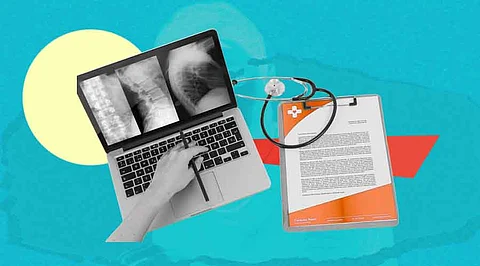

The healthcare industry is undergoing a profound transformation thanks to data science and artificial intelligence (AI). These powerful technologies are revolutionizing the way medical professionals diagnose and treat diseases, ultimately saving lives and improving patient outcomes.
One of the most significant contributions of data science and AI in healthcare is the ability to predict disease risk and facilitate early detection. By analyzing large datasets containing patient records, genetic information, and lifestyle data, predictive models can identify individuals at high risk for specific diseases. For instance, AI algorithms can predict the likelihood of developing conditions like diabetes, cancer, or heart disease. Early detection allows healthcare providers to intervene promptly, leading to more effective treatment and potentially life-saving interventions.
Medical imaging is a critical component of healthcare diagnosis. Data science and AI have significantly improved the accuracy and efficiency of medical image interpretation. Machine learning algorithms can analyze X-rays, MRIs, CT scans, and other imaging data to detect anomalies, such as tumors or fractures. Computer-aided diagnosis systems can assist radiologists and other healthcare professionals by providing quick, reliable assessments, reducing the chances of human error, and speeding up the diagnosis process.
Genomic medicine, made possible through data science and AI, has unlocked the potential for personalized treatment plans. By analyzing an individual's genetic makeup, healthcare providers can tailor treatments to their unique genetic characteristics. This approach enhances treatment effectiveness and reduces adverse effects. For example, in cancer care, genomic analysis can help select the most suitable chemotherapy regimen, increasing the chances of remission.
Handling vast amounts of unstructured data in electronic health records (EHRs) can be challenging. NLP, a branch of AI, plays a crucial role in making sense of these records. NLP algorithms can extract valuable information from patient notes, reports, and medical literature. This not only aids in more accurate diagnoses but also supports research and the development of best clinical practices.
Data science and AI have facilitated remote patient monitoring, allowing individuals to manage chronic conditions from the comfort of their homes. Wearable devices can collect real-time data on vital signs, blood sugar levels, and other health metrics. AI algorithms can analyze this data and alert healthcare providers to any concerning changes. Remote monitoring enables timely interventions, reduces hospitalizations, and enhances patient quality of life.
Data science and AI have made significant contributions to healthcare management beyond diagnosis. They play a critical role in fraud detection, optimizing resource allocation, and improving operational efficiency. By analyzing claims data, AI can detect fraudulent activities, reducing the financial burden on healthcare systems. Additionally, predictive modeling can help hospitals and healthcare organizations manage resources more efficiently, ensuring that patients receive the care they need promptly.
Data science and AI are transforming healthcare diagnosis and the entire medical field. The ability to predict disease risks, analyze medical images, and personalize treatment plans is revolutionizing patient care. With the aid of natural language processing, medical records are more accessible and valuable than ever. Remote patient monitoring and healthcare management have also seen significant improvements. As technology continues to advance, we can expect even more remarkable breakthroughs in healthcare, ultimately leading to improved diagnoses, more effective treatments, and better patient outcomes. The marriage of data science and AI with medicine is truly a game-changer, opening up new horizons in the world of healthcare.
Join our WhatsApp Channel to get the latest news, exclusives and videos on WhatsApp
_____________
Disclaimer: Analytics Insight does not provide financial advice or guidance on cryptocurrencies and stocks. Also note that the cryptocurrencies mentioned/listed on the website could potentially be scams, i.e. designed to induce you to invest financial resources that may be lost forever and not be recoverable once investments are made. This article is provided for informational purposes and does not constitute investment advice. You are responsible for conducting your own research (DYOR) before making any investments. Read more about the financial risks involved here.
